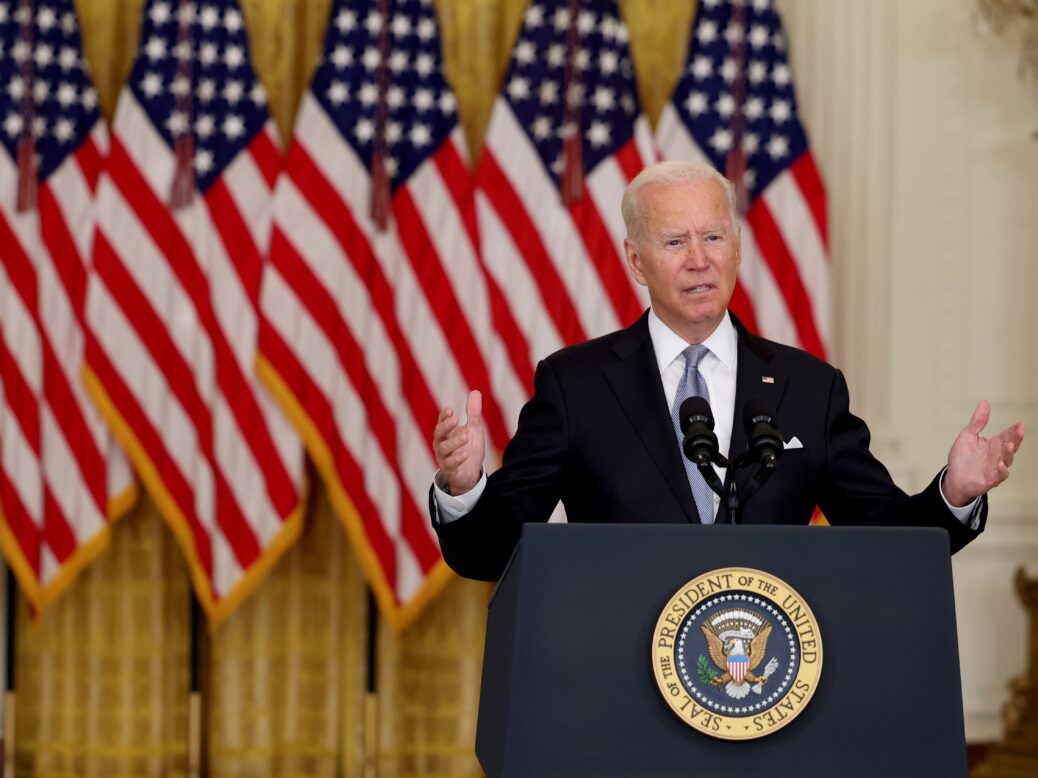
On Monday 16 August, a day after Taliban forces took control of Afghanistan’s capital, Joe Biden finally acknowledged the “rapid collapse” of the Afghan government and stood by his decision to end the American mission in the country.
Addressing reporters in the White House, Biden’s opened with perfunctory comments about how the US withdrawal had unfolded. He insisted the US invasion of and war in Afghanistan was “never supposed to be nation-building”. He said there are now other terrorist forces and geopolitical threats that require attention. And he added that he came into office after his predecessor, Donald Trump, had made a deal with the Taliban to withdraw by May this year.
“I stand squarely behind my decision,” he said. “After 20 years, I’ve learned the hard way that there was never a good time to withdraw US forces.”
The country’s fall to the Taliban insurgents “did unfold more quickly than we had anticipated”, Biden admitted, blaming Afghan leaders for giving up and fleeing the country and Afghan troops for folding so soon. But such events, he claimed, also prove he made the right decision: American troops could not have continued to fight a war that Afghans aren’t willing to fight themselves.
This appears to ignore the fact that Americans have known for a long time of issues within the Afghan armed forces. Years ago, it was reported that hundreds of thousands of alleged Afghan troops were actually non-existent “ghost soldiers”, and that, per the Special Inspector General for Afghanistan Reconstruction, the money was likely being passed around corrupt Afghan government officials. (The United States also did the Afghan armed forces few favours by pulling out as part of its withdrawal the contractors who were servicing Afghanistan’s planes and helicopters.)
Biden insisted he would not repeat the mistakes of the past. “The mistake of staying and fighting indefinitely… on doubling down on a civil war in a foreign country… Those are the mistakes we cannot continue to repeat,” he said.
[See also: How much did the Afghanistan war cost?]
Only then did the President acknowledge the “gut-wrenching” scenes unfolding in Afghanistan, which are particularly painful for any American who has spent time serving or working in Afghanistan, or who has lost a loved one who did.
He then, and only then, spoke about plans to secure the airfield in Kabul and ensure the departure of Afghan citizens alongside “the civilian personnel of our allies”. Biden noted that 2,000 Afghans eligible for special immigration visas (SIV) and their families have already moved to the United States. But there are tens of thousands more for whom getting out is a matter of life and death: advocates estimate that, when family members are included, there are between 50,000 to 80,000 evacuees eligible under the SIV programme.
“Some of the Afghans did not want to leave earlier,” Biden said in an attempt to explain why more people weren’t given refuge sooner. He added that the Afghan government discouraged the US from organising a mass exodus.
This explanation is, to put it as diplomatically as possible, absurd. If it wanted to, the Biden administration could surely have overridden the Afghan government. Biden declared the United States would be withdrawing from Afghanistan in April, yet the state department did not announce a P-2 programme – for those who still worked for the US or with US funding but not for long enough to qualify for a SIV – until two weeks ago. Reuters reported that the state department reached out to advocates for names of Afghans who would need to leave on 14 August.
It’s true that, had the Biden administration put in place steps for a fast, mass exit of Afghans, it might have been tacitly admitting that the Afghan government would collapse, that the Taliban would take over, and that the people who had helped the United States could not possibly remain safely in Afghanistan. It might have been bad for optics. But what are optics next to human lives?
Biden was correct in noting that successive American administrations have made many missteps in Afghanistan over the past two decades. But he did not acknowledge that his own administration’s refusal to help vulnerable Afghans leave the country sooner was among those errors, even though US intelligence suggested the Taliban could take over Kabul in a matter of weeks.
“I’m President of the United States of America, and the buck stops with me,” Biden said. On this, he isn’t wrong. If only the rest of his speech reflected that statement.
[See also: What the Taliban’s victory means for Afghanistan and the world]



